Duterte Year 2: Philippines moves closer to free college tuition for all
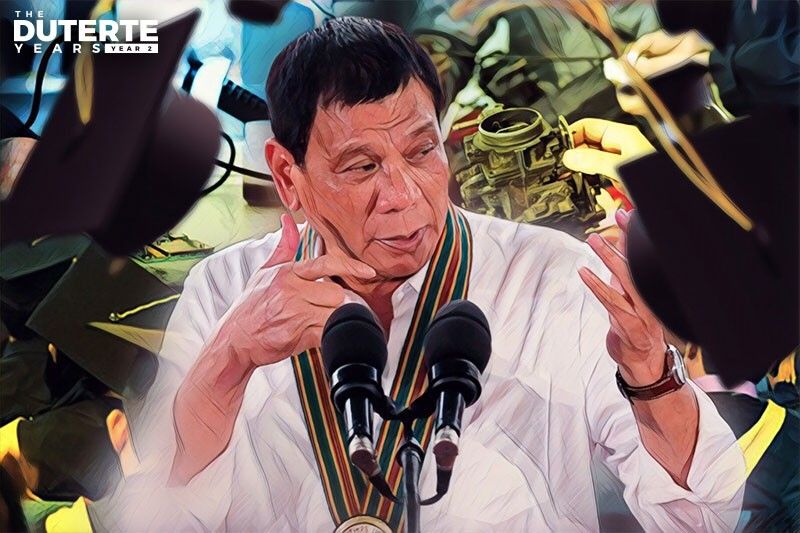
This piece is a part of a news analysis series on the second year of the Duterte administration
MANILA, Philippines — Erin Estrada, 19, studies Behavioral Science at the state-run University of the Philippines in Manila.
Already in her third year, she is set to benefit from the government’s free tuition program this year.
Although Estrada believes that universal access to education in the Philippines has a long way to go before becoming a reality, she says the law, officially known as the Universal Access to Quality Tertiary Education Act, is “a big step and a victory in its own.”
“This is definitely a huge help to those students and families. It would give them some room to breathe in terms of their expenses,” she said in an interview with Philstar.com.
Estrada is just one of the estimated 1.3 million students — up from 900,000 last year — projected to enroll in state and local universities and benefit from the government’s free college tuition program.
The program is considered Philippine President Rodrigo Duterte’s “biggest social justice program” for higher education and is meant to remove a fundamental “barrier” to higher education in the Philippines: cost.
“It’s a reframing of the education paradigm,” Prospero De Vera, officer in charge of the Commission on Higher Education, told Philstar.com in February.
For Estrada, removing tuition costs is just one step to ensure access to education, regardless of social status.
She said that she still saw some problems such as the law’s coverage of only undergraduate students and the cap on the number of years that a student can avail of the expanded state subsidy.
“I stand by my belief that education is a right, and it should be given to everyone unconditionally as it is the state's duty to give us that,” she said.
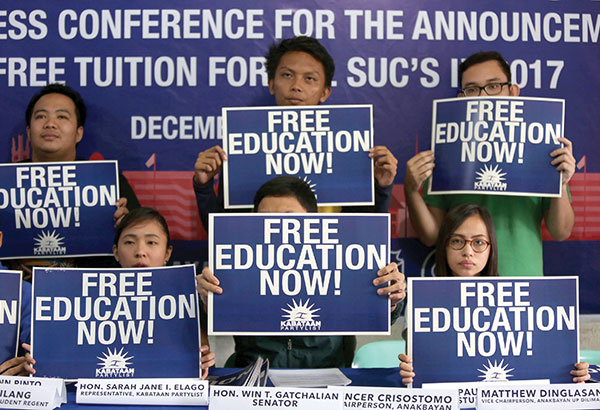
Lawmakers themselves helped gather support for the bill. In this file photo, Sen. Sherwin Gatchalian and Rep. Sarah Elago (Kabataan party-list) call for free education. Boy Santos, file.
Government commitment
Sen. Paolo Benigno Aquino IV, one of the main authors of the measure, said that the law is primarily meant to benefit students who struggle to pay for their tuition and school fees and, in many cases, drop out because they cannot afford college education.
He added that only a small percentage of students in state schools belong to the top two income deciles of the population, meaning that a significant number of families who really need help will benefit from the program.
“For the few who can afford, they have the option to opt-out of the free tuition benefits and pay the full fee to contribute to the school,” he told Philstar.com.
The Universal Access to Quality Tertiary Education Act, or Republic Act 10931, was signed into law by Duterte in August 2017 despite initial hesitation amid concerns from the government’s economic managers that the cost could punch a big hole in the national budget.
“The budget for free tuition is really quite large. It’s not a pittance. It’s going to be unsustainable over time,” Socioeconomic Planning Secretary Ernesto Pernia warned last year.
In the end, the president decided that the long-term benefits of the program outweighed its short-term budgetary challenges, according to then Deputy Executive Secretary Menardo Guevarra, who described the law as “a pillar of the president’s social development policy.”
The law will cover fees of students in 112 state universities and colleges, 78 local universities and colleges and technical-vocational education and training programs beginning this school year.
For this year, an estimated P40 billion was allocated for the program, according to CHED. Of this amount, P16 billion will be for free higher education, P7 billion for free technical-vocational education, P15.9 billion for subsidy, P1 billion for the student loan program and P11 million for a tracking and reporting system.
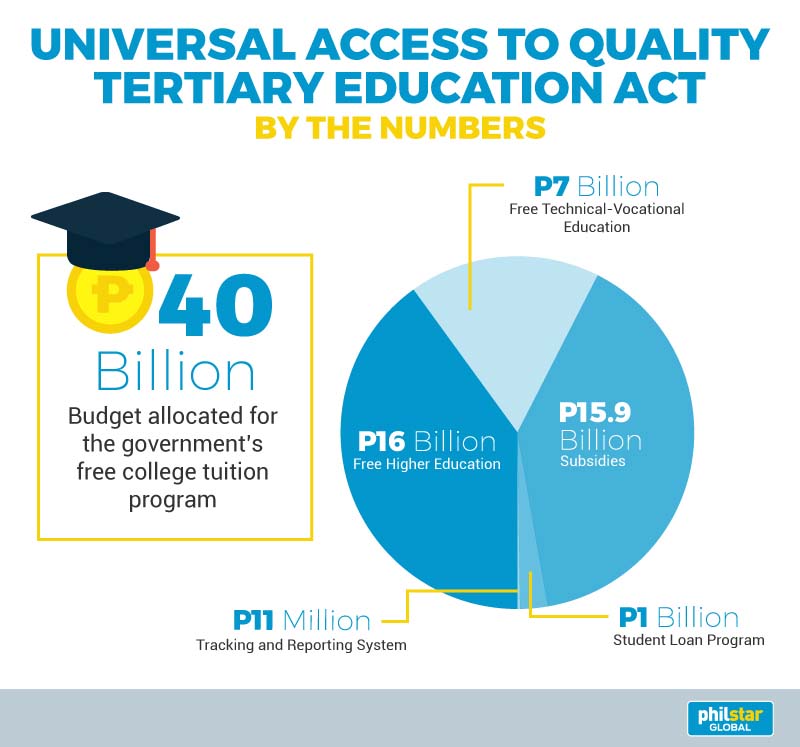
Carmelita Yadao-Sison, the officer in charge of the Office of the Executive Director of CHED’s UniFAST Secretariat, said that the benefits of the policy will only be felt several years from now.
UniFAST, or the Unified Financial Assistance System for Tertiary Education Act, is the law that puts under one body all government-funded student financial assistance programs for the tertiary level.
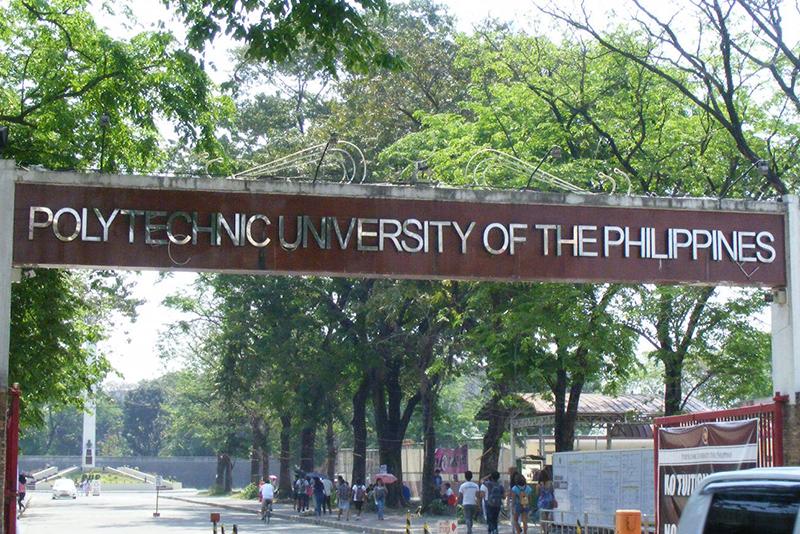
The Mabini Campus of the Polytechnic University of the Philippines in Manila. The free college tuition law will cover 112 SUCs, and 78 LUCs and technical-vocational education and training programs this year. CC BY/Team Deremoe.
“[T]he only qualification to avail the benefits of free higher education is for an applicant to pass the admission requirements and retention policies. As long as you are a student of good standing, that’s all you need, whether you are rich or poor or middle class,” Sison said in an interview with Philstar.com.
She said that the program would cover the tuition and other fees of undergraduate students during their whole stay in college. She said that students would be given four years to finish their studies and another year of extension.
She also expressed confidence that the succeeding administrations would continue the program as this is “social legislation” that could really make Filipinos feel the government.
“If the next admin(istration) wants to be able to sustain its popularity, they should not scrap this program because they will be fighting the Filipino people,” she said.
Sen. Aquino said that since this is already a law and part of national policy the government should fund it accordingly.
Aquino said that the money needed to fund the program is just a fraction of the annual increase in the Philippine national budget, which he put at 10 percent, fueled by the economy’s good performance.
He said that the Senate, which showed its full backing for the measure during deliberations, would also ensure that the program is adequately financed since Congress holds the power of the purse.
“The Senate made RA 10931 a priority and we will ensure that it is funded every year,” he said.
Hiccups in implementation
If there’s one thing that could hamper the implementation of the policy, it could be the differences in the interpretation and operationalization of the law, according to the Liberal Party senator.
He spoke of parents and students in Dipolog City who told him that they were still being asked by the state university in their area to pay “exclusive miscellaneous fees” including "energy fees". He said that CHED had already ruled that the law’s intent was for schools not to collect any amount from students.
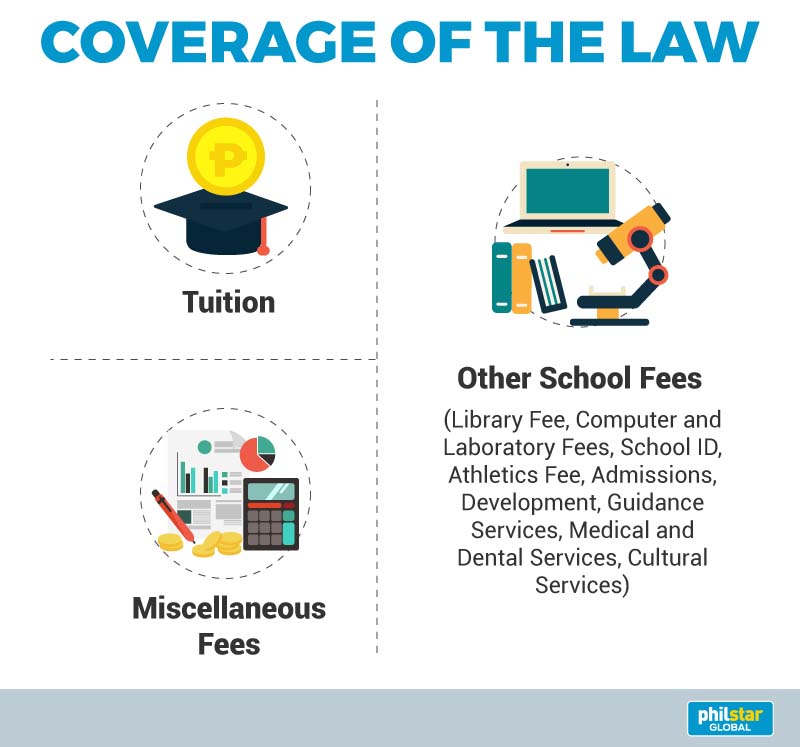
“Like any new law, the challenge at the beginning of implementation will be getting all the stakeholders on the same page on these implementing rules and guidelines,” he said, stressing the importance of communication among CHED, schools and parents.
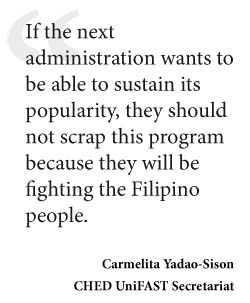 One point of divergence in the law’s intent has been the possible reimbursement of fees paid by state university and college students during the second semester of the last academic year.
One point of divergence in the law’s intent has been the possible reimbursement of fees paid by state university and college students during the second semester of the last academic year.
Aquino insisted in a statement in March that this be done since they worked with the Budget department, the Legislative Budget Research and Monitoring Office and CHED to ensure that students would be reimbursed for second semester expenses.
He also reminded CHED of its earlier commitment that the P40 billion budget allocated this year is enough to cover second semester fees.
Aquino said that CHED has yet to respond to his Feb. 21, 2018 and March 26, 2018 letters following up on this issue.
“We will bring this up again when their budget will be tackled in the Senate this August,” he said.
This call is also shared by Kabataan Party-list, whose representative, Sarah Elago, called CHED’s statements of fully funding fees “ironic” when it denied there were funds for refunds.
Sison, the CHED official, stressed that no refund could happen as the law is clear that the free tuition program would start during academic year 2018-2019.
She also said that even the Budget department had already said that a retroactive application of the law was not possible as it was not yet funded in 2017.
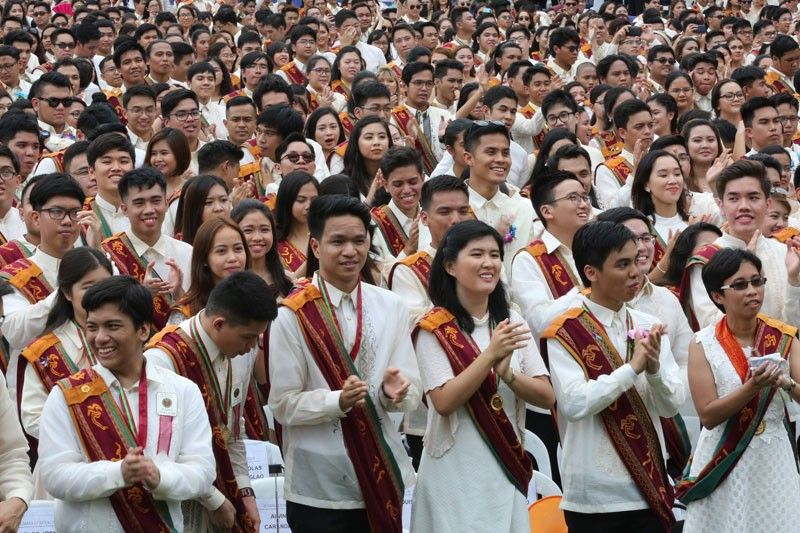
A graduation ceremony at the University of the Philippines in Diliman. The free tuition law covers four years of college and an extension of one year. Boy Santos, file
Aside from a refund of second semester fees, Kabataan party-list also slammed the "return service agreement" in the Implementing Rules and Regulations of the law. It likened this provision to forced labor during the Spanish period.
The budget for the improvement of schools and their facilities is also not covered by the measure, Sison said, adding that this is taken care of by other items in the national outlay.
Sison also doused concerns about the possible mass migration of students to state and local universities and colleges owing to the program.
She said that state schools knew their “carrying capacity” and could not just disproportionately increase the number of their students because they still have standards to maintain.
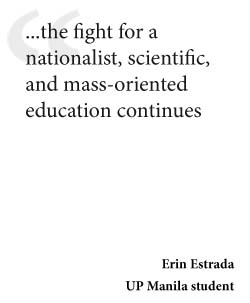 De Vera said that CHED would require state schools to craft “thorough” admission and retention requirements in anticipation of the possible influx of students.
De Vera said that CHED would require state schools to craft “thorough” admission and retention requirements in anticipation of the possible influx of students.
Aside from this, De Vera said in February that poor students in both state and private schools could get an education subsidy, with those in state universities and colleges getting P40,000 a year while those in private institutions receiving P60,000 a year.
Despite what Estrada, the UP student, called “a big step,” Kabataan party-list said that the struggle for what it called “genuine free education” continues.
“How disappointing that CHED has only bastardized the victory of a decades-long struggle of the youth by formulating an IRR that negates the concept of education as a right,” it said in March after CHED released the law’s IRR.
Estrada echoed this declaration, “Not touching on monetary concerns, however, the fight for a nationalist, scientific, and mass-oriented education continues,” referring to criticism that education in the Philippines is focused on producing labor for multinational companies and for businesses.
Although providing Filipinos access to college education is important, groups like Kabataan party-list contend that what that education teaches is just as critical. — with Philstar.com intern Christian De Lano Deiparine
ALSO READ:
Duterte Year 2: TRAIN threatens poor, president's popularity
Duterte Year 2: 'Without rights, a return to rule by tyrants'
- Latest
- Trending


























